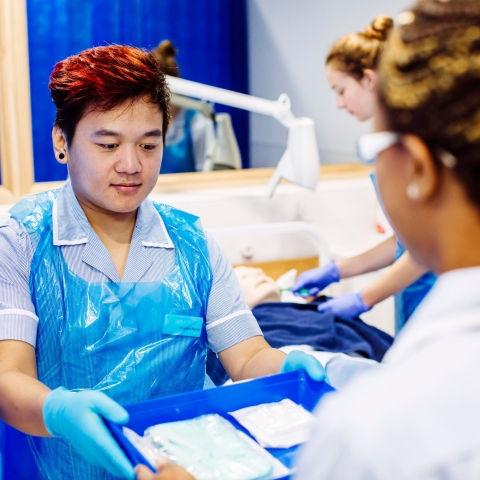
If you're thinking of applying for a place on a doctoral programme, leading to a Doctor of Philosophy (PhD) degree or a professional doctorate, you'll need to decide if doctoral study is right for you and how to prepare your application. This guide will cover what a doctorate is, where to locate opportunities, and how to apply for doctoral study.
Should I do a doctorate?
Doing a doctorate is a very personal decision; everyone has different reasons for completing a doctoral programme and it's important to understand what your motivation might be and the commitment involved.
You might decide to work towards a professional doctorate such as a Doctor of Education or Doctor of Business Administration, or the traditional Doctor of Philosophy programme – or PhD as people call it. PhD degrees are available for almost every type of academic discipline, and are awarded on successful completion of a thesis - based on a programme of original research - and followed by an oral examination or 'viva'. Doctoral programmes can be full or part time (or a combination of both), and last around 3–4 years on average. Students typically enrol for a specified period and generally aim to complete their work in that time.
The nature of this type of degree means you need to be extremely interested in independent research. While a doctorate can suit many career paths, it especially suits those who want to pursue an academic, specialist or research-based career.
If you'd like to discuss whether doctorate study is the right path for you, you can always book an appointment with a careers adviser for support and guidance.
Finding a PhD
Some doctoral programmes will be advertised, but for others, you may need to write to a particular department showing your interest and chosen field of research by submitting a proposal or plan of your research intentions.
You can search for advertised programmes using the following resources:

Getting a place
Once you've decided on a doctoral programme the next step is to secure a place. To help you gain a place, it helps to understand what course selectors are looking for when they're assessing applications for places, so research this carefully prior to making your application.
There's no national system for doctoral study programme applications. Application systems vary from one institution, sometimes from one department, to another. It's important to contact the relevant staff to find out how and when to apply. Once you have done this, make sure you follow application procedures carefully, observing any important deadlines.
Formal proposal
You might be asked to write a formal proposal, prepare an abstract, complete an application form and/or submit a CV as part of your doctoral application. It might also be a requirement to meet an expert tutor in the field and decide on a topic for research prior to applying.
In any application, it's important to be able to describe your ideas clearly and in a well produced format. You can explain what you want to do, why you want to research your chosen discipline and how you intend to go about it. You might also need to provide referencing for your ideas so make sure to read around your chosen academic specialism.
Previous academic experience
As part of your application, you could have to submit details regarding your previous academic experience - this might include any contributions to academic journal publications, or attendance at any specialist conferences. You also might have done important work, voluntary experience or practical experience related to your chosen subject. It's important to keep records of any appropriate experience so you can elaborate on them when applying - this is especially true of any research work you've completed or with which you have assisted.
For some programmes, admissions staff might want evidence you have the potential to lead research teams in the future. This might not always be a requirement, so check individual departmental requirements before completing the application. If you're told that this will be a consideration, prepare your case thoroughly and gather and present any relevant evidence.
Check whether there are any other parts to the application process; for example, there might be exercises for you to complete, such as writing an abstract from a draft of an academic paper. This type of task might be given so that the admissions team can assess your written communication skills.
Other experience/attributes
Pursuing doctoral study is an experience that will vary according to the individual - workloads can be high so think about your reasons for applying.
Ensure your personal circumstances are well suited to the nature of the work. For example, do you have the time to visit libraries and conduct research? Do you have space at home, work or elsewhere to do reading and paperwork related to your studies? Doctoral study requires a lot of stamina, determination and the ability to work alone for much of the time, so consider times you have demonstrated such behaviours from your previous studies and experience.
Interview questions
Whatever type of programme you're applying for, it's likely you will have to attend an interview. Potential questions might include:
- Are you capable of original thought and do you have an enquiring mind?
- Do you have a good general knowledge and, more specifically, knowledge of your chosen subject area?
- Can you express ideas using succinct, clear, grammatically correct writing?
- Are you organised and good at managing your own time?
- Do you have a clear purpose for taking on a doctorate, and perhaps a future plan of how you will benefit from completing one?

Top tips for your application
- Be clear about your motivation to tackle a research degree
- Use relevant sources such as FindAPhD and Jobs.ac.uk to establish which department can give you the necessary support, facilities and supervision
- Discuss your plans with the staff and clarify exactly how they want you to apply – get advice from known leaders in the field if possible
- Be clear about any closing dates that may exist and, if they do, observe them carefully
- Make early plans around funding – you should know and be able to explain where the financial support is coming from, and that it's going to be adequate
- If you need financial support, make sure you apply according to the published procedures and in good time
- Ask for help if necessary – there are many staff in academic departments and student services teams who can help you prepare for your higher degree and make a successful transition to a future career path
Further resources
Check out the below resources for more information about the application process for doctoral study:









